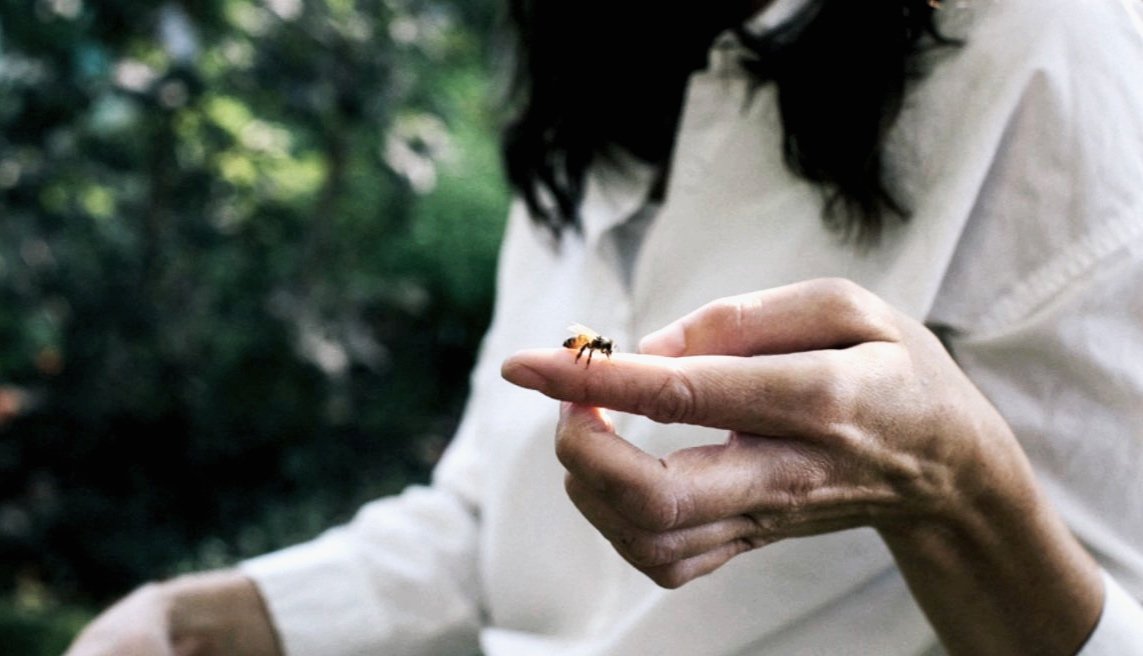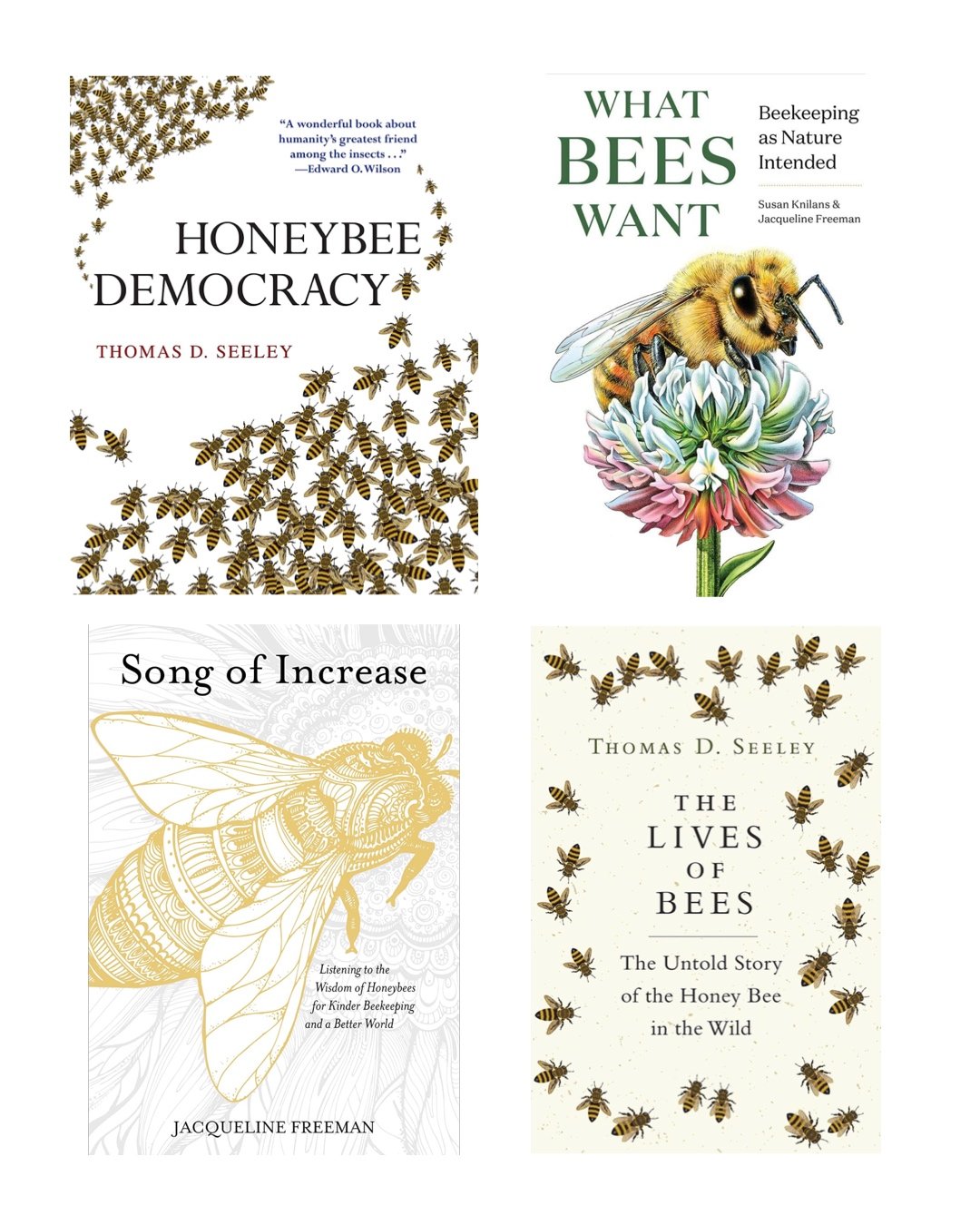tending to the bees
“Oh Bees,” she says. “I send greetings to your Queen. I wish to be her friend, and to prepare a safe home for her, and for you who are her daughters, and to tell you the news every day. May you carry messages from the land of the living to all souls who dwell in the land of shadows. Please tell me now whether you accept my offer.”
― Margaret Atwood
winter dreams of bees
three winters ago, I attended my first beekeeping class at our local library. i was interesting in keeping bees at our cottage homestead in town. the man teaching the class was kind but his bent to keeping bees was conventional, commercial and more focused on harvesting honey, he later went on to take too much honey from a friend’s first year hive, in which they were not able to survive the winter. it has become too clear why, but it is not clear why our greed outweighs their need.
at the time, we weren’t prepared to take on bee keeping but I was grateful for the introduction to bees. now at our land i’ve found the perfect spot in at the edge of the woods and our wild apple orchard for early spring blooms but still near the pond for a water source, and it is southern facing for warmth. my dear friend, also keeps bees + has offered her guidance as we embark on a new journey in bee tending. I want to plant more flowering fruit trees and cast wildflower seeds to call the bees home.
that will be in spring as trees blossom, but for now as the earth is quiet + still under a blanket of snow, my mind is buzzing as i begin to explore my “why” of keeping bees. this question sparked by the course on natural beekeeping from Ariella Daly. I thoroughly enjoy her feminist yet soft natured, experiential approach to bee stewardship as she refers to this age old practice. between her words to mull on and a stack of books on my night table, i’m immersed in a world of bees.
Ariella Daly’s Natural Beekeeping
tending to bees + land stewardship
if I think back, i first became aware of the need to support bees and their declining habitat in college. as i learned more about devastating effects of petrochemicals and industrial agriculture rippling worldwide and in my own backyard, i learned that colonies of bees were moved around the nation and california to pollinate the vast almond orchards. bees not unlike other beings in this capitalist system are commodified and subjected to abuses. with the spraying of pesticides and reduction of habitat, places for bees to thrive are diminishing, yet bees are vital to our own food supply + our survival. bees and their presence have come in and out of my consciousness for a while. Aj’s friend who married us was a beekeeper and devoted his life to the wisdom of the bees.
one of my greatest dreams for our land is for it to be a home, not only for us, but in kind, for other sentient lifeforms to life and thrive. i’ve seen the ability for common spaces to support other life, as our little yard now is home to migratory birds in the winter, monarch butterflies in the summer, our rose bush home to a toad in the autumn, the skeletons of summer’s gardens home to burrowing rabbits + moles in the winter, along with various birds and insects wintering. it is my belief, we can cultivate our home spaces for vitality + deep connection. i’m constantly pondering how i can support the local over the global in my daily actions. bees are a keystone species integral to our survival, revered as sacred beings throughout ancient cultures. the English would tell the bees of important happenings in their lives, deaths, marriages, births, social happenings, as bees were a part of the whole. moreover, we are nature, not separate from and i’m called to learn ways to step into the caretaking + learning roles. more than wanting to collect my own honey for self sufficiency sake, i want to understand the wisdom of the bees, create pollinator friendly environs, and nourish their life force.
bees keeping as a spiritual practice
bees are interwoven with our land + our existence. they are alchemists + sensual being, buzzing interacting with plants to gather pollen and nectar, but our view of bees and the commodification of honey have fallen under the purview of capitalism when in many cultures, from Ancient Greece to Mesopotamia to the Celtic isles, humans relationship with the bees was one of sacred connection. here in the united states today the european honeybees were brought here in the 17th century. i’ve been researching native bees + honey bees, with little information about the existence of indigenous honey bees. if anything is becoming clear is that bees support our agriculture, they face challenges created by humans + if we are to continue to partake in honey, their food + lifeblood we have an imperative to give back in reciprocity.
as an herbalist + gardener + human, i am compelled to cultivate spaces for bees to be in harmony, to be nourished alongside me, through right relationship with our land and the plants. if I continue to use honey for my preparations and in my tea, i want to understand the processes and support those lifeforms that aid in my healing. as Ariella reiterates throughout “honey is bee food” consuming honey should be a journey of relationship + mutual respect. in her lifetime, one maiden bee produces 1/2 tsp of honey, as a whole a hive produces pounds + pounds in a year. my winter meditation will be appreciate each spoonful of honey i use knowing the effort, intricacies + the lifecycle of plants + bees infused into it.
the duration of this winter, i will be filling my journals with notes, research, musings about how to create a hive and environment well suited to the bees before i begin a relationship with them in the spring. not as a commodity but as a complex organisms brimming with life + wonder.
“The keeping of bees is like the direction of sunbeams.” -Henry David Thoreau
good reads for natural bee stewardship
1 | honeybee democracy by thomas seeley
2 | what bees want: beekeeping as nature intended by susan knilans and jacqueline freeman
3 | song of increase by jacqueline freeman
4 | the lives of bees by thomas seely


